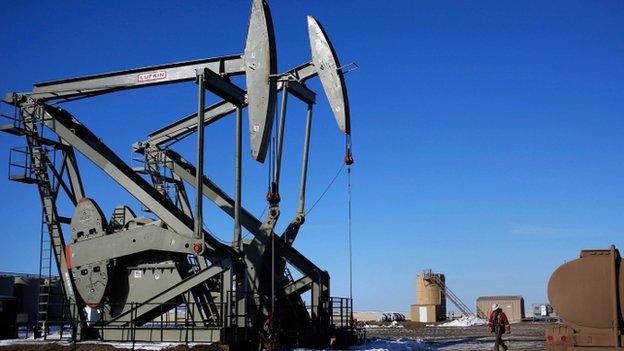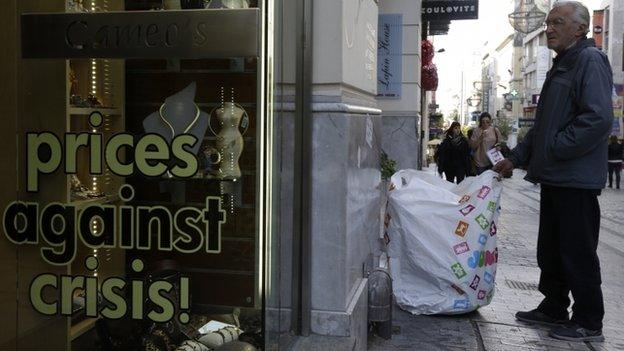The world economy in 2014
- Published

Global oil prices have slumped
We have come through 2014 without a major disaster for the global economy. But it hasn't been a terribly good year.
Before it started, the International Monetary Fund forecast a year of "yet another transition". Advanced economies would strengthen, the IMF said, while emerging economies had already weakened.
Some of that turned out to be right. The US and Britain did indeed gain some strength. The slowdown in the emerging world, which was already apparent a year ago, has continued in China, Brazil and Russia - most of the famous Brics grouping, in other words.
But other rich countries have continued to turn in a disappointing performance.
While the Eurozone did continue to grow, external, it failed to gain momentum.
Now there are some concerns that even Germany may have been afflicted, external by the Eurozone economic malaise. Certainly, Europe's traditional powerhouse suffered a setback with economic activity falling back in the second quarter of 2014.
There was one bit of good news. The Greek economy finally started to expand, external. But it was just a tentative start after a very deep decline - by more than 25% in total. Unemployment remains excruciatingly high.
Japan too had a setback after an increase in the tax on consumer spending. The Japanese government has enormous debts, so there was a reason for it, but the economic consequences have led the government to delay the next tax rise it was planning.
Impact of sanctions
International economic forecasts often carry a health warning about the risk posed by "geopolitical events".

The Greek economy showed signs of recovery
This year, one of those events did make itself felt: the crisis in Ukraine.
Ukraine itself was affected and so was Russia due to Western sanctions. The sanctions also appear to have hit Germany whose exports to Russia fell sharply.
There was one geopolitical crisis that didn't have the global economic impact that might have been expected.
The rise of Islamic State in Iraq and Syria did not affect the oil market in the way that many previous crises in the Middle East had, when concerns about possible disruptions pushed prices up.
The same was largely true of the instability in Libya and the latest episode in the conflict between Israel and the Palestinians.
IS had little impact on the global supply of oil, which has been increasingly plentiful due to the shale oil revolution in the US. At the same time, demand for oil has weakened due to the slowdown in China and the persistent sluggishness of the Eurozone and Japan.
The result of all those factors was a fall in the oil price of 40%, external from its peak in June.
That aggravated Russia's financial problems, but it is an economic boost for countries that import oil - which is to say most of the world.